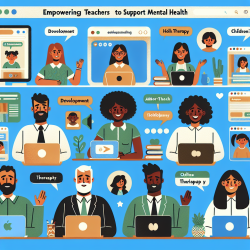As speech-language pathologists, we understand the importance of holistic child development. Recent research, such as the study "Perceptions, attitudes, and knowledge of teachers serving as mental health lay counselors in a low and middle-income country: a mixed methods pragmatic pilot study," provides valuable insights into how teachers can play a crucial role in supporting children's mental health.
This study explored the feasibility of teachers in Darjeeling, India, serving as lay mental health counselors. The results are promising and can be instrumental in guiding our practices and encouraging further research.
Key Findings and Implementation Strategies
- Willingness to Serve: Teachers expressed a strong willingness to serve as lay counselors. This highlights the potential for training teachers to address mental health needs effectively within the classroom setting.
- Inclusive Attitudes: Training led to more inclusive attitudes towards mental health, although quantitative measures showed these attitudes reverted to pre-training levels post-intervention. This suggests ongoing support and reinforcement are crucial.
- Knowledge Retention: Teachers retained mental health knowledge qualitatively, even though quantitative assessments did not show significant changes. This indicates the need for practical, hands-on training that aligns with their daily responsibilities.
Practical Tips for Practitioners
- Provide Continuous Support: Regular supervision and follow-up sessions can help reinforce training and support teachers in applying their knowledge effectively.
- Integrate Mental Health into Daily Activities: Encourage teachers to incorporate mental health strategies into their daily teaching practices, making it a seamless part of the educational process.
- Foster a Supportive Environment: Creating a supportive school environment that values mental health can help sustain positive attitudes and practices among teachers.
By leveraging the insights from this study, we can better support teachers in their dual role as educators and mental health facilitators. This not only enhances their capacity to support children's mental health but also creates a more inclusive and supportive learning environment.
To read the original research paper, please follow this link: Perceptions, attitudes, and knowledge of teachers serving as mental health lay counselors in a low and middle-income country: a mixed methods pragmatic pilot study.










